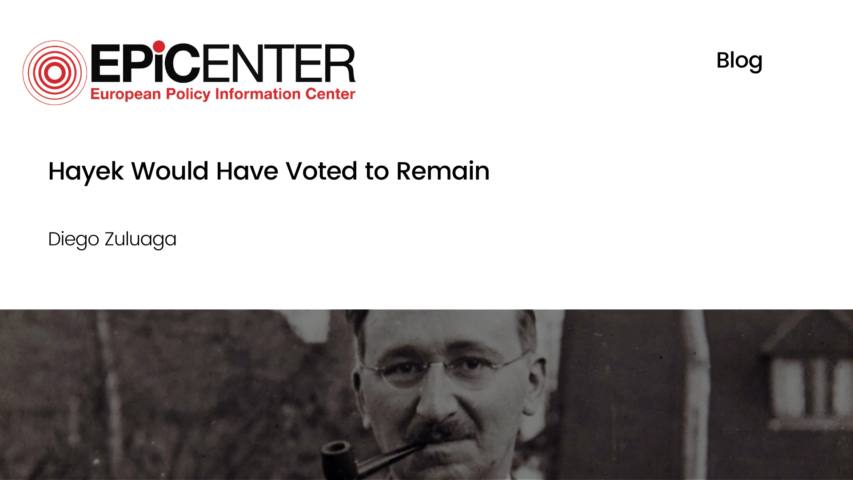Hayek Would Have Voted to Remain

Hayek Would Have Voted to Remain
Diego Zuluaga // 17.03.2016
To conjecture what Hayek’s stance might have been on Britain’s EU referendum and the current state of the European project more generally, it is instructive to consider his biography. The first half of Hayek’s long life was characterised by the steady unravelling of the liberal order into which he had been born. In 1899, Europe was practically borderless, with only a handful of the more underdeveloped countries, such as Russia and the Ottoman Empire, requiring passports at their frontiers. It was a world of free trade, large-scale immigration, low taxation and little regulation of private affairs, and a high degree of cultural innovation.
All of that was gone by the time Hayek’s most popular work, The Road to Serfdom, was published in 1944. His native Austria-Hungary, a multinational, polyglot, cosmopolitan and – by the late nineteenth century – liberal monarchy was long dissolved and replaced by nation states, many of them the product of human design at the various peace conferences. The First World War had halted the expansion of world trade, while the Great Depression saw the consensus around monetary policy – the gold standard – and economic policy – laissez faire – challenged and then superseded by more interventionist approaches. Finally, the Russian Revolution of 1917, the ascent to power of Mussolini’s fascists in Italy, and the election of Hitler in 1933 all introduced socialistic forms of government into large parts of Europe.
These events and the horror of World War II shaped postwar developments. On one hand, government planning of a significant share of economic activity was taken for granted. This was the case even in the ‘free’ economies of the West, which competed with the unfree communist countries for intellectual and political dominance. On the other hand, a number of institutions – GATT, the IMF, the UN – were created in a deliberate bid to promote peace, avoid the harmful economic policies of the postwar period and encourage mutually beneficial relations between countries.
Hayek’s life was devoted to go beyond the latter and build the intellectual foundations of a movement which would work to reinstate an updated and improved version of the pre-1914 world order. Some of his key writings – Individualism and Economic Order, Serfdom itself – delve deeply into the sort of international institutions which are needed for freedom and peace to flourish. Others – The Constitution of Liberty; Law, Legislation and Liberty – consider the legal and constitutional foundations on which free societies bloom.
One essay in particular, “The Economic Conditions of Interstate Federalism,” offers a glimpse of what Hayek would have considered a desirable and successful economic federation. Written in 1939, this text is striking not only for the author’s optimism at a time of darkness, but also for the prescience of its observations. Notions familiar to anyone who is acquainted with today’s EU, such as the “free movement of men, goods and capital,” and the emergence of a “single market,” are dealt with extensively in the essay.
In it, Hayek argues that political integration necessitates economic integration in the form of free internal trade, since protectionist barriers will tend to lead to frictions between regions and end up undermining political federation. He posits that economic integration will serve to promote peace among the constituent states and eliminate incentives for protection. He concludes that economic links through international institutions are not only desirable but a requisite development for true liberalism to be restored: “the abrogation of national sovereignties and the creation of an effective international order of law is a necessary complement and the logical consummation of the liberal programme.”
Reading Hayek’s essay, one is left with little doubt that he would have found much to like in the European Union as we know it today. Economic integration through international institutions – first the European Coal and Steel Community, then the European Economic Community, then the European Single Market – has relentlessly eroded national protectionism and served to raise the living standards of even the poorest regions in the least developed member countries.
Perhaps to the chagrin of free-market Eurosceptics, Hayek would arguably have looked approvingly at the emergence of a single currency to replace the various national currencies. He would have been relieved to know that the European Central Bank’s ethos was largely inherited from the Bundesbank’s hard money tradition, rather than the inflationary propensities of French, Italian and Spanish central bankers. And while he might have been disappointed that monetary policy was still a public monopoly, he would surely have welcome the ‘denationalisation’ of currency management and its transfer to a supranational body.
Not everything about the EU would have been to Hayek’s liking, of course. In particular, I think he would have been very critical of the constructivism of EU officials and their foolish drive to create a European identity rather than let one emerge gradually and spontaneously. He would probably also have been shocked at the level of centralised regulation stemming from the EU institutions. However, I believe he would have seen this trend not as an indictment of the European project, but rather as symptomatic of a climate of opinion that was still to be shifted much further in the direction of free markets, not just in Europe but worldwide, where similar regulatory centralisation has taken place.
So much for Hayek’s views on today’s European Union. How about Brexit? Hayek was an Anglophile, an avowed fan of the common law, and sceptical of continental rationalism. As a Burkean, he was also in favour of institutional reform rather than revolution. Thus it seems to me that he would very much have appreciated British involvement in the European project, as a moderating influence on the constructivist tendencies of continental politicians and a healthy liberal counterbalance to German corporatism and French etatism. I cannot possibly imagine Hayek endorsing Brexit, especially now that national sovereignty and border control have become the rallying cries of the Leave camp.
Hypothesising what Hayek’s position might have been on the EU and the upcoming referendum helps us to realise how much the world has changed for the better since Hayek himself surmised about the future of liberalism and the international order. What was wildly utopian in 1939 has now largely become reality along the lines that he envisaged. With that in mind and in light of his own life experience, it is clear to me that Hayek would had advised against a British exit from the European Union.
EPICENTER publications and contributions from our member think tanks are designed to promote the discussion of economic issues and the role of markets in solving economic and social problems. As with all EPICENTER publications, the views expressed here are those of the author and not EPICENTER or its member think tanks (which have no corporate view).



